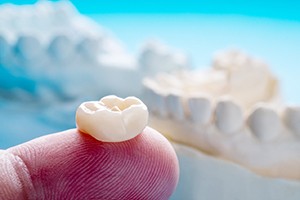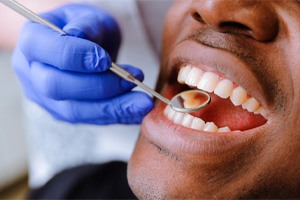Dental Crowns – Waterford, PA
Preserving Your Natural Teeth
For some patients, hearing that they need a restoration to restore the health of their smile can cause them to worry. Even with great dental hygiene, countless people damage their teeth and need to have them restored. With a dental crown from Summit Family Dentistry, you can rest assured that your smile will look completely natural and be protected from further damage. That way, you can laugh and smile with complete confidence that nobody will be zeroing-in on your damaged pearly white. If you need a dental crown or would like to learn more about them, be sure to schedule a consultation with your dentist today.
What are Dental Crowns?

Dental crowns are cap-like structures that are custom-built to fit over the biting surface of your natural tooth. They can be made from a wide range of materials, but most patients prefer natural-looking porcelain or ceramic. For protection, your crown is cemented to your prepared natural tooth and can last for several years with the proper care and maintenance.
What Are Dental Crowns Needed For?

Many people aren’t aware that dental crowns can be used to fix a variety of oral problems. Some of the most common situations that we see where we suggest restoration with a dental crown include:
- Severe dental decay that requires a large filling can be fortified with a dental crown, providing your tooth with additional protection from infection.
- Dental trauma that causes your tooth to become cracked or broken can be treated with a dental crown to help restore the strength of your tooth and prevent it from becoming further damaged.
- Root canal therapy removes the infected pulp inside a tooth. After the procedure, we’ll suggest placing a dental crown to restore its shape, size, and strength so you can use it without experiencing discomfort.
- Fixed bridges are secured to your natural teeth to close gaps in your smile. On either side of the replacement tooth is a dental crown to hold it in place.
What is the Process of Getting a Crown?

The dental crown procedure typically takes place over the course of two appointments and can be broken down into the following steps:
- Preparing your natural tooth to receive your crown.
- Taking impressions of your tooth to send to our dental laboratory.
- Placing a temporary crown until your permanent one arrives.
- Removing your temporary crown to cement your permanent one into place.
After making any final adjustments and polishing your tooth, your procedure will be complete! You’ll be able to use your damaged tooth like you normally would without having to worry about any pain, because it will be protected by a durable crown.
Understanding the Cost of Dental Crowns

If you choose to get it, crown treatment will benefit your smile. These prosthetic caps both protect teeth and help them look beautiful! Still, you might fear the cost of dental crowns. (They can’t help if they exceed your budget.) In reality, though, a crown’s price varies by patient. You’ll need to consult Dr. Patel for an exact estimate. At that time, we at Summit Family Dentistry will work to make your care affordable. Just keep reading to find out how or call us for details.
Factors That Affect the Cost of Dental Crowns

During the initial crown consultation, Dr. Patel will perform an oral exam. Doing so lets him assess factors relevant to treatment price. These include:
- Damage Severity – Depending on your tooth’s damage, a crown for it will cost more or less. Minor harm, for example, may mean you only need the actual cap. In contrast, severe damage will likely require preliminary work (root canal therapy, etc.) as an extra service. It’ll thus cost more than the former scenario.
- Crown Material – Metallic crowns tend to be gaudy and don’t cost much. Meanwhile, those made from porcelain or ceramic are tooth-colored and usually get pricey.
- Crown Crafting – Crowns made the traditional way are fairly inexpensive. Ones made with CEREC technology, though, often cost more.
As Dr. Patel explains the factors, note that the cheapest crowns aren’t ideal. Good oral care depends on high quality, while the least pricey options usually don’t work well. Therefore, try to get pretty, reliable crown work that looks right and lasts long.
Does Dental Insurance Cover Dental Crowns?

Fortunately, dental insurance usually does cover dental crowns. It considers the placement of these dental caps as a major procedure. Therefore, it often grants partial coverage that meets up to 50% of a crown’s cost.
At the same time, do note that exceptions exist. Your dental plan may not cover crowns, or it does so with special rules. Given these facts, confirm your benefits before pursuing treatment. Our office can even help you do so.
Other Options for Making Dental Crowns Affordable

Besides insurance, there are other ways to make crowns affordable. Many dental practices offer a variety of helpful payment options.
Consider our own Summit Family Dentistry, for example. Our team offers flexible financing via CareCredit and Sunbit – reputable third-party financiers. You can pay for dental crowns with monthly, low-interest installments by relying on these groups. That method would let you cover their cost gradually instead of all at once.
As you can see, Summit Family Dentistry can make your dental crowns budget-friendly. That being said, learn more about crown financing by booking a consultation with us!
Dental Crowns FAQs

Prior to receiving a dental crown, you may have questions about this treatment. We are here to answer your queries! In fact, we’ve responded to some common questions here for your convenience. Please take a little bit of time to read our answers, but if you have others or would like clarification, don’t hesitate to reach out to our team and ask. After Dr. Patel has had the chance to examine you, he can offer information as well as guidance for what would best suit your individual needs.
Does Getting a Dental Crown Hurt?
To Dr. Patel and the rest of our team at Summit Family Dentistry, your comfort is a top priority. The process of preparing for a dental crown does entail removing the tooth’s enamel to make space for the porcelain crown, but before we do this, we will give you a local anesthetic, which numbs the area. As a result, you will not feel anything that Dr. Patel does to the tooth to prepare it for the crown.
Will Others Be Able to Tell I Have a Dental Crown?
When expertly crafted, prosthetic dental crowns can look just like real enamel. Dr. Patel will work closely with our dental lab technicians to make sure your crown appears natural and blends in perfectly with the teeth around it. In fact, you may not be able to tell which tooth has the prosthetic and which teeth don’t. As a result, you can smile with complete confidence!
How Long Do Dental Crowns Last?
With the proper maintenance, dental crowns can last for about 10 years before needing to be replaced. Fortunately, this maintenance is essentially the same as taking care of your natural teeth. Every day, you must brush and floss your teeth at minimum. You should also drink plenty of water, avoid consuming too much sugar, and stop chewing on hard objects like pencils or ice. If you follow these tips, there’s no reason why your dental crown can’t last as long as possible!
Are Dental Crowns Covered by Dental Insurance?
Although some policies stray from the norm, dental crowns are generally covered in part by dental insurance. In fact, most plans pay for about half the cost of crowns, leaving the other half up to you. Depending on the amount and your credit approval, you may be able to pay the out-of-pocket portion through CareCredit, which breaks up the total into easier monthly payments. Our front desk team can walk you through the steps to apply and work with your insurance so you know what to expect financially.
